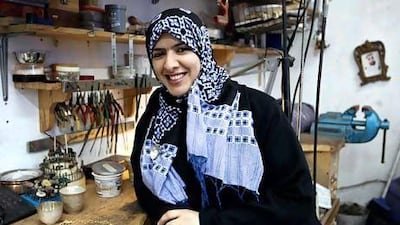The UAE was a very different place to launch a venture a decade ago, say business owners. That is when Azza Al Qubaisi was looking to become a designer of jewellery and corporate gifts.
Helping hand Resources to help SME owners.
Free zones Those in Fujairah and Ras Al Khaimah such as Fujairah Creative City have lower set-up costs that helps knowledge-based start-ups to work with virtual offices.
Dubai SME An agency of the Dubai Government's Department of Economic Development, it is entrusted with the development of the sector. It recently signed partnership agreements with several banks to offer benefits to the top 100 SMEs.
Baraka Ventures Runs workshops for entrepreneurs and delivers programmes in partnership with universities, which teach people how to set up a business in six weeks. It also becomes an equity partner in a small number of businesses and also, where possible, gives free help to companies.
Dubai Chamber of Commerce Offers different advisory services, including arranging conferences or get-togethers on improving financing options.
She struggled to get the correct licence to suit her profession. She wanted a licence for a craft person and silversmith, "but they didn't have anything like that", Ms Al Qubaisi says.
"I basically needed to get a goldsmith or trade licence, like other jewellery production shops - not as an individual, so I had to pay as much as [them]."
It also took time to establish her name. "Such a field was not available locally at the time," she says. "It took time for people to accept me in my profession."
When Ms Al Qubaisi received her first corporate gifts order in 2005, requesting 500 handmade coffee cups priced at Dh1,000 (US$272) each, she ran into numerous challenges and missed the initial delivery deadline.
The client was nevertheless impressed with the end result and she discovered a largely untapped demand where companies wanted someone to design and produce corporate gifts.
Today, the business is "doing very, very well," she says. "Most corporate gifts are bought from abroad so I make a unique product. Most of my designs capture the culture locally."
With the emergence of different government initiatives that fund entrepreneurs in the region, Ms Al Qubaisi says it has become easier for aspiring business owners to get started today. But plenty of challenges still remain for those who want to start a small or medium-sized enterprise (SME). Some local experts weigh in with their thoughts on how this sector of the economy is changing.
Which elements have become harder when starting a new venture in the Emirates?
Satyajeet Roy, the head of commercial banking for Citibank in the UAE: Although the environment is still very conducive for business growth and starting ventures, the cost of setting up a business has gone up to an extent. While some banks are ready to lend to existing steady business houses, very few will provide facilities to start-ups. Additionally, getting credit from suppliers has become challenging in the past 12 to 24 months.
What aspects have become easier when launching a new business?
Mr Roy: The cost of leasing office premises as well as residential rents have come down in recent times. This is a huge saving for an SME as it reduces office expenses as well as employee housing costs.
What else has become better for those wanting to start a new firm?
Jitendra Gianchandani, the chairman and managing partner of the business advisory company Jitendra Consulting: It is easier to access free-zone and government officials. [More] online services have been introduced. Rent outside free zones has come down drastically due to abundance of office space.
What are some of the major costs businesses face when starting up?
Essam Al Tamimi, the founder of the law firm Al Tamimi & Co and author of a book series on setting up business in different emirates:There is schooling, health care, visas. These are normally, and have been over recent history, the cost that basically some of the businesses are suffering from.
Are there certain sectors that seem poised for more growth among SMEs?
Mr Roy: Sectors like manufacturing have become important as the UAE is looking forward to [being a] regional manufacturing hub for Mena [Middle East and North Africa], due to the political situation in the rest of the Mena markets. This is proving to be an opportunity for SMEs in the manufacturing sector [particularly in] industrial goods and chemicals. In the trading business, the sectors on a growth track are foodstuff, oil and gas. On the services front, there is a lot of focus on the environment-related companies, IT-related businesses, logistics as well as non-real estate specialised contracting firms.
What still needs to be provided to further develop the number of small and medium-sized firms in the Emirates?
Mohamed Omar Abdullah, the Undersecretary for the Abu Dhabi Department of Economic Development: We need to look at how to provide flexible access to finance so [SMEs can meet their] financial needs for their own operation. Also, to help them explore the international market in order to support export. These things are still needed. That is being now looked at to complete our responsibility building this important sector, because this sector contributes to the GDP anywhere from 60 to 80 per cent in many countries.
Mr Gianchandani: Easy finance access by banks and training for SMEs to be more innovative, plus more flexible rules and support if they fail to pay government charges.
What hurdles need to be removed for SMEs to further prosper in the UAE?
Mr Roy: A credit bureau will definitely help, which will enable banks to take decisions on obligers quickly. Apart from that, legal reforms - like not treating a bounced cheque as a criminal offence as per the existing practice - would encourage some budding entrepreneurs to take the next step.
nparmar@thenational.ae


